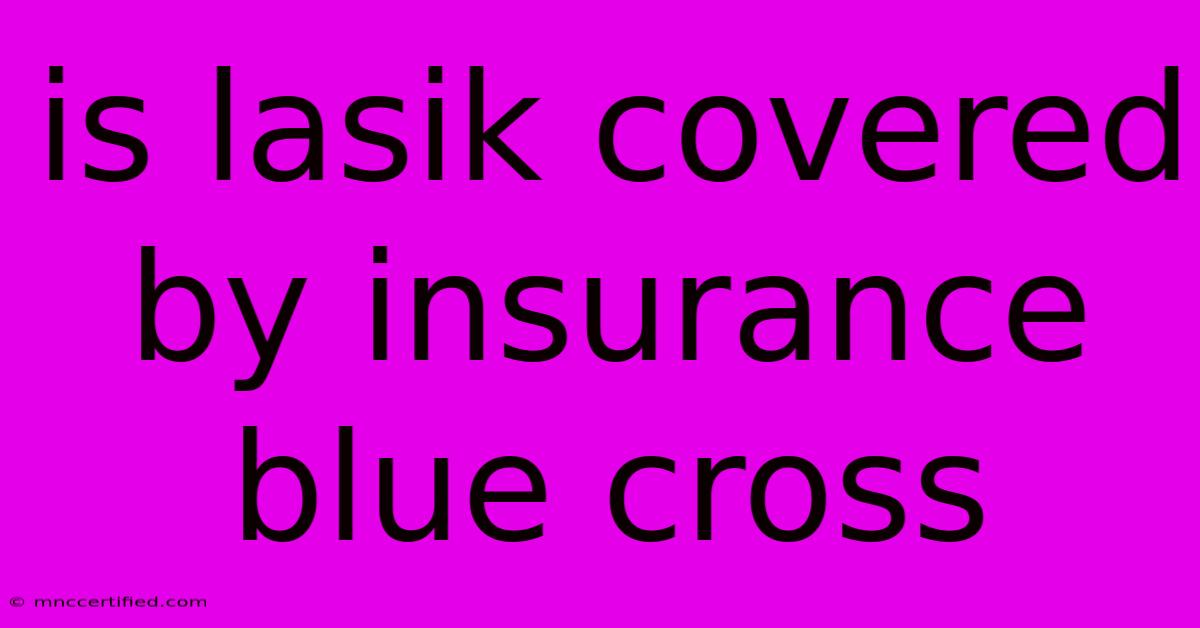Is Lasik Covered By Insurance Blue Cross

Table of Contents
Is LASIK Covered by Blue Cross Insurance?
If you're considering LASIK eye surgery to improve your vision, one of the first questions you'll likely ask is, "Will my insurance cover it?" The answer for Blue Cross insurance holders isn't a simple yes or no. Whether LASIK is covered by Blue Cross depends on your specific plan, state of residence, and the provider.
Understanding Blue Cross Coverage
Blue Cross Blue Shield is a large network of insurance companies, each offering various plans with different coverage options. This means that coverage for elective procedures like LASIK can vary greatly depending on your individual plan.
Here's what you need to know:
- Most Blue Cross plans consider LASIK an elective procedure. This means it's not considered medically necessary, and coverage isn't guaranteed.
- Your plan's coverage details matter. Some plans may offer limited coverage for LASIK, while others may have complete exclusions.
- Your state's regulations can influence coverage. Some states have laws that require insurance companies to offer at least some coverage for vision correction procedures.
How to Determine Your Coverage
To find out if your specific Blue Cross plan covers LASIK, follow these steps:
- Contact your Blue Cross provider: The easiest way to get a definitive answer is to contact your insurer directly.
- Review your plan documents: Your plan's policy booklet should outline coverage for elective procedures like LASIK.
- Ask for a pre-authorization: Even if your plan appears to have some coverage for LASIK, it's essential to get pre-authorization before undergoing the procedure. This will ensure you know your financial responsibility upfront.
Factors Influencing LASIK Coverage
Several factors can influence whether Blue Cross will cover your LASIK surgery, including:
- Your age: Some plans may have age restrictions for LASIK coverage.
- Your medical history: Pre-existing conditions or eye problems may affect coverage.
- Your vision correction needs: Coverage may be limited based on the severity of your refractive error.
Alternatives to Traditional LASIK Coverage
If your Blue Cross plan doesn't cover LASIK, or if you're facing high out-of-pocket costs, there are alternatives:
- Flexible spending accounts (FSAs): These accounts allow you to use pre-tax dollars for eligible medical expenses, including LASIK.
- Health savings accounts (HSAs): Similar to FSAs, HSAs allow you to save pre-tax dollars for medical expenses, including vision correction procedures.
- Financing options: Many LASIK centers offer financing plans to help spread the cost of treatment.
The Bottom Line
Determining whether Blue Cross covers your LASIK surgery requires careful examination of your specific plan and state regulations. It's best to contact your insurer directly and obtain pre-authorization before proceeding with treatment. While LASIK may not always be fully covered, there are ways to make the procedure more affordable. Remember to research your options and make an informed decision that aligns with your financial situation and vision correction goals.

Thank you for visiting our website wich cover about Is Lasik Covered By Insurance Blue Cross. We hope the information provided has been useful to you. Feel free to contact us if you have any questions or need further assistance. See you next time and dont miss to bookmark.
Featured Posts
-
Danbury Ct House Race Results Unofficial
Nov 07, 2024
-
Commercial Real Estate Investment Analysis
Nov 07, 2024
-
Critical Insurance Coverage In India Pdf
Nov 07, 2024
-
Norwich Lineup Announced Millwall Match
Nov 07, 2024
-
Monarch National Insurance Company Reviews
Nov 07, 2024